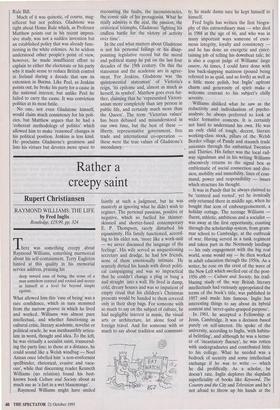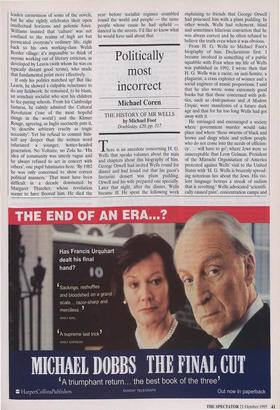Rather a creepy saint
Rupert Christiansen
RAYMOND WILLIAMS: THE LIFE by Fred Inglis Routledge, £19.99, pp. 324 here was something creepy about Raymond Williams, something marmoreal about his self-containment. Terry Eaglcton hinted at this quality in his memorial service address, praising his deep inward ease of being, the sense of a man somehow centred and rooted and secure in himself at a level far beyond simple egoism.
What allowed him this 'ease of being' was a rare confidence, which in turn stemmed from the narrow groove in which he lived and worked. Williams was almost pure intellectual, and whether functioning as cultural critic, literary academic, novelist or political oracle, he was inexhaustibly articu- late in word, thought and idea. To the left, he was virtually a socialist saint, transcend- ing the party line; to those at a distance, he could sound like a Welsh windbag — Noel Annan once labelled him 'a non-conformist spellbinder, rhetorical, evasive and vacu- ous', while that discerning reader Kenneth Williams (no relation) found his best- known book Culture and Society about as much use as 'a fart in a wet blancmange'.
Raymond Williams might have smiled faintly at such a judgment, but he was masterly at ignoring what he didn't wish to register. The personal passions, positive or negative, which so fuelled his thinner- skinned and shorter-fused contemporary E. P. Thompson, rarely disturbed his equanimity. His family functioned, accord- ing to his elder son, 'more like a work-unit — we never discussed the language of the feelings'. His wife served as unquestioning secretary and drudge, he had few friends, none of them emotionally intimate. He scarcely dirtied his hands with direct politi- cal campaigning and was so impractical that he couldn't change a plug or bang a nail straight into a wall. He lived in damp, cold, dreary houses and was so impatient of empty ritual that his children's Christmas presents would be handed to them covered only in their shop bags. For someone with so much to say on the subject of culture, he had negligible interest in music, the visual arts or architecture, let alone food or foreign travel. And for someone with so much to say about tradition and communi- ty, he made damn sure he kept himself to himself.
Fred Inglis has written the first biogra- phy of this extraordinary man — who died in 1988 at the age of 66, and who was in many important ways someone of enor- mous integrity, loyalty and consistency and he has done an energetic and enter- taining job of telling his downbeat tale; he is also a cogent judge of Williams' large oeuvre. At times, I could have done with less back-slapping matiness (pound being referred to as quid, and so forth) as well as a little more polish, but Inglis' upfront charm and generosity of spirit make a welcome contrast to his subject's chilly serenity.
Williams disliked what he saw as the reductivity and individualism of psycho- analysis: he always preferred to look at wider formative contexts. It is certainly not hard to understand his own, He was an only child of tough, decent, literate working-class stock, pillars of the Welsh Border village of Pandy and staunch trade unionists through the embattled Twenties and Thirties. His father was the local rail- way signalman and in his writing Williams obsessively returns to the signal box as emblematic of social connection and divi- sion, mobility and immobility, lines of com- mand, power and responsibility — issues which structure his thought.
It was in Pandy that he always claimed to be 'centred and rooted', yet he ironically only returned there in middle age, when he bought that icon of embourgeoisement, a holiday cottage. The teenage Williams fluent, athletic, ambitious and a socialist was away at the first opportunity, coasting through the scholarship system, from gram- mar school to Cambridge, at the outbreak of war. Having served in a tank regiment and taken part in the Normandy landings — his only engagement with the big real world, some would say — he then worked in adult education through the 1950s. As a writer, he rose on the crest of the wave of the New Left which swelled out of the post- 1956 ebb — Culture and Society, his trail- blazing study of the way British literary intellectuals had variously appropriated the terms of the book's title, was published in 1957 and made him famous. Inglis has interesting things to say about its hybrid content and 'never-quite-grasped purpose'.
In 1961, he accepted a Fellowship at Jesus, Cambridge. It was a decision based purely on self-interest. He spoke of the university, according to Inglis, 'with habitu- al belittling', and although he was a lectur- er of 'incantatory fluency', he was rotten with undergraduates and contributed little to his college. What he needed was a bedrock of security and some intellectual exchange if he was to write — which he did prolifically. As a scholar, he doesn't rate. Inglis deplores the slapdash superficiality of books like Keyword, The Count7), and the City and Television and he's not afraid to throw up his hands at the leaden earnestness of some of the novels, but he also rightly celebrates their open intellectual horizons and polemic force. Williams insisted that 'culture' was not confined to the realms of high art but permeated everyone's ordinary life, right back to his own working-class Welsh Border village: it's impossible to think of anyone working out of literary criticism, as developed by Leavis (with whom he was on typically distant good terms), who made that fundamental point more effectively.
If only his politics matched up! But like Leavis, he showed a culpable reluctance to do any fieldwork: he remained, to be blunt, an armchair socialist who sent his children to fee-paying schools. From his Cambridge fastness, he calmly admired the Cultural Revolution Cone of the most hopeful things in the world') and the Khmer Rouge, agreeing, as Inglis succinctly puts it, `to describe arbitrary cruelty as tragic necessity'. Yet his refusal to commit him- self any deeper than the written word Infuriated a younger, hotter-headed generation. No Voltaire, no Zola he. 'His idea of community was utterly vague and he always refused to act in concert with others', one pupil fulminates here. 'By 1982 he was only concerned to show correct political manners.' That must have been difficult in a decade dominated by Margaret Thatcher, whose revolution seems to have floored him. He died the year before socialist regimes crumbled round the world and people — the same people whose cause he had upheld danced in the streets. I'd like to know what he would have said about that.











































































 Previous page
Previous page